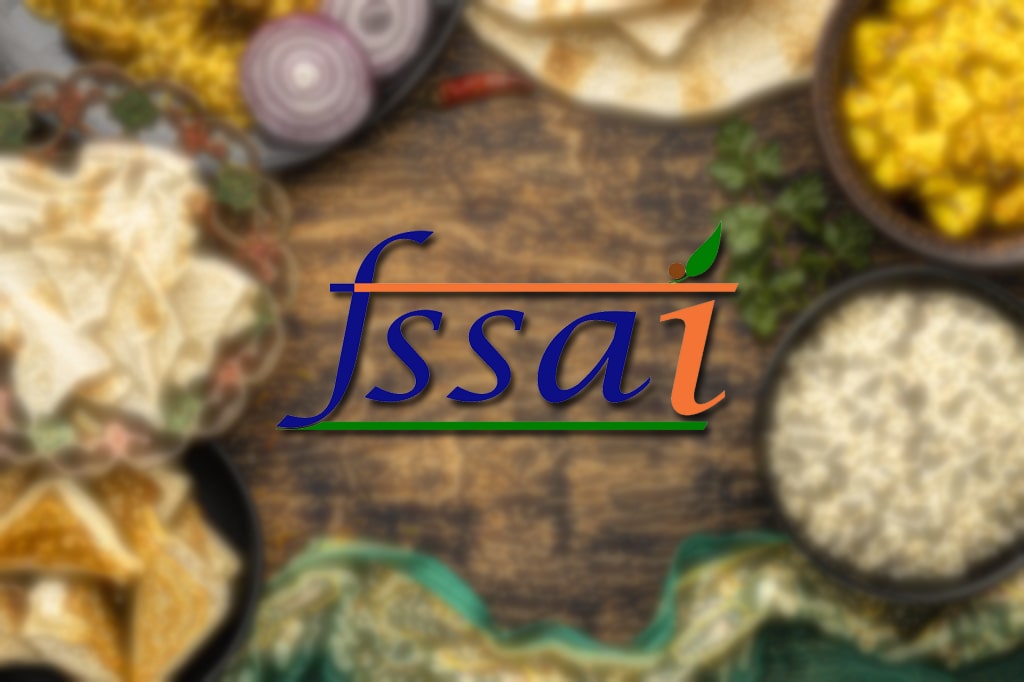The Food Safety and Standards Authority of India (FSSAI) is an organisation that screens and governs the food industry in India. It is a self-governing body that was established by the Ministry of Health and Family Welfare of the Indian Government. The FSSAI was established under the Food Safety and Standards Act of 2006, which is a consolidated law in India to govern food safety and regulation.
Food safety is regulated and supervised by the FSSAI, which is in charge of protecting and promoting public health. Any food company in India that manufactures, stores, transports, or distributes food must have a FSSAI license or register. Depending on the nature of the business and its size, FSSAI registration or licensing may be necessary.
Functions of FSSAI
The function of FSSAI is to develop regulations to set food safety standards, to Establish guidelines for accreditation of laboratories for food testing, Assist the central government with technical and scientific advice, contribute formulation of international technical standards for food. Collect and compile data on food consumption, pollution, emerging risks, etc and to disseminate knowledge and raise awareness to Indian citizens about food safety and nutrition.
FSSAI Registration
Every Food Business Operator (FBO) involved in the manufacturing, processing, storage, distribution and sale of food products in the country is obliged to be licensed/registered under the Food Safety & Standards Authority of India, according to Section 31(1) and 31(2) of the FSS Act, 2006. The Food Safety & Standards (Licensing and Registration of Food Businesses) Regulations, 2011, govern the licensing and registration process and standards. Registration is intended for petty food makers, which include petty retailers, hawkers, itinerant vendors, or temporary stall holders, as well as tiny or cottage scale businesses with annual sales of up to 12 lakhs. All food enterprises with an annual revenue exceeding this threshold must obtain a license.This registration procedure is intended to increase accountability on the part of the FBO in order to maintain the quality of the food products.
Who all are eligible For FSSAI registration?
For all FBOs in the small-scale food business, the FSSAI Registration is a fundamental license.
- Any FBO with a minimum annual revenue of Rs. 12 lakh.
- Petty retailers dealing in food products.
- Any individual who independently manufactures or sells food.
- Anyone who distributes food at a religious or social gathering, except for a caterer
- Food sale is done by the temporary stall holder.
- Food-related small-scale or cottage industries, as well as the following:
- Food production capacity (other than milk and meat): up to 100 kg/ltr per day
- Milk procurement, handling, and collection capacity: up to 500 ltr per day
- Slaughtering capacity: two large animals, ten small animals, or 50 poultry birds per day or less.
These FBOs must apply through the Food Licensing and Registration System for an FSSAI Registration Certificate. The image of the FBO is embedded in this registration certificate, which also contains a QR code and a 14-digit registration number that begins with 2 (2xxxxxxxxxxx).
FSSAI License
An FSSAI license is required for food processing and manufacturing FBOs and businesses with a turnover of more than 12 lakh. The FSSAI License is divided into Central License and State License.
State license
The FSSAI state license must be obtained by the Medium-size processors, manufacturers, traders, marketers, or transporters from the state government. The medium-sized FBO is required to obtain a state license if its annual turnover is more than Rs. 12 lakh but not more than Rs. 20 crore. When its annual turnover exceeds Rs. 20 crore, the FBO must obtain a central license.
Benefits of a state license
It strengthens brand recognition among the target end users and the general public, Enhances the company’s creditworthiness, attracts more customers and encourages the business owner to use best practices to ensure food safety.
Central license
The FSSAI central license must be obtained by large businesses that process, transport, manufacture, and engage in international trade of food products. The FBO is deemed a large business and is required to obtain an FSSAI central license from the Central Government if its annual turnover exceeds Rs. 20 crore.
Features of FSSAI Central License
A FSSAI central license is required for all central food businesses, including imports, exports, and interstate trade. When it expires, the FSSAI central license can be renewed for another five years. A thorough application process for the FSSAI central license is necessary, and it includes submitting pertinent documents like food safety management plans, laboratory test results, and evidence of financial stability. The Food Safety and Standards Authority of India (FSSAI), a government organisation responsible for dealing with regulating and ensuring the safety and quality of food products in India, issues the FSSAI central license. The FSSAI central license holder is required to follow the FSSAI’s food safety regulations and guidelines, and compliance is verified through periodic inspections. On all food packaging and marketing materials, the FSSAI central license holder must also include the FSSAI license number. The Central FSSAI license holder can participate in various export promotion programs and international fairs and exhibitions.
Essential Criteria for obtaining FSSAI Central License
The FSSAI Central License is a legal consent granted by FSSAI to food businesses that have
Annual turnover more than Rs 20 crores, its various units running in multiple states, the monthly or annual production exceeding the set limit and must have annual turnover above Rs. 20 crore who wants to start a grocery import/export business and grocery sales business on his own e-commerce website.
FSSAI License Cost
The applicant needs to pay the following fees while submitting the FSSAI registration form.
- FSSAI Basic Registration – Fee of Rs.100
- FSSAI State License – Fee between Rs.2,500 to Rs.5,000 (Depends on the type of business carried out)
- FSSAI Central License – Fee of Rs.7,500
FSSAI Registration Status
Applicants will be notified via SMS/email notifications at many stages of the application processing by FSSAI. You can also check the status of your FSSAI registration by entering the application reference number obtained after submitting your application to the FSSAI in the “Application Status Tracking” tab on the FoSCOS website. The different stages of your FSSAI registration status can be seen by tracking your application status. If the FSSAI registration status is indicated as ‘Withdrawal of application’, the FSSAI authority has withdrawn the request for necessary amendments or clarifications. Applicants must submit a response within 30 days from the reset date to avoid the risk of the application being rejected. Once the FSSAI authority issues the FSSAI registration certificate, the applicants can download the certificate by logging into the website at FoSCOS.
FSSAI Annual Returns
Who Should File FSSAI Returns
The Businesses which have a turnover of each FBO exceeding INR 1.2 lakh. FBO who imports, sells, manufactures, exports, stores, distributes, handles or transports food of any kind and food business operators involved in the production and distribution of milk.
Types of FSSAI Returns
There are two types of FSSAI returns:
FSSAI Form D1 (Annual Return)
The FSSAI licensing authority requires all food importers, manufacturers, packers, labelers, relabelers, and repackers to submit Form D1. Form D1 can be filed online or physically as provided by the Food Safety Officer. All food businesses, regardless of the production they are involved in, are required to file Form D1 according to the type of food they sold in the previous financial year.
FSSAI Form D2 (Semi-Annual Statement)
Form D2 is a semi-annual tax return. Any food business that manufactures or imports milk or dairy products must submit Form D2.
Note: All his FBOs file separate returns for each license issued under the FSSAI regulations, regardless of whether the same FBO operates multiple food licensing entities/businesses . Therefore, FBOs with multiple licenses must file a separate declaration for each FSSAI license. It doesn’t matter that the same FBO holds these FSSAI licenses.
Benefits of FSSAI Annual Return Compliance in India
- Maintain reputation
Annual compliance by an entity or individual registered with the FSSAI requirements maintains and relatively enhances the overall reputation of the company/entity. This will allow the public to trust companies to meet their annual compliance obligations mandated by the Government of India.
- Improve brand value
Companies that are FSSAI licensed and compliant with other regulations will look better in the eyes of consumers. In addition to these benefits, the value you get from the unit is high compared to the decent units on the market.
- Receive government support
This method of annual compliance also has the advantage of increasing government support for businesses that meet FSSAI requirements.
Due Date for Filing Returns
The due date to file the FSSAI form D1 by the FBOs is on or before 31 May of every financial year. FSSAI Form D2 is a half-annual form. It is filed by food business operators who manufacture milk and dairy products between April 1st and September 30th and between October 1st and March 31st every year.
Exempted Entities for Filing Returns
The FSSAI exempted some businesses from submitting the annual return by issuing a notification of exemption. They are fast-food joints, restaurants, grocery stores and canteens.
Conclusion
In summary, the FSSAI is the authority that issues licenses to people engaged in the food business. This license is both necessary and fruitful for your business. The government has established this authority and licensing system for the benefit of the people. The agency stepped in to regulate food business in an effective way, allowing people the luxury of enjoying food from anywhere without suspecting they were dealing with shady food business.
FSSAI was established under the Food Safety and Standards Act 2006, an consolidated act on Food Safety and Regulation in India. This ensures food quality checks and limits food tampering and substandard product sales. Responsible for the registration and licensing of food business operators (FBOs) in India and establishes the rules and regulations for operating food businesses in India. Obtaining a license can bring legal benefits to food companies, build goodwill, ensure food safety, raise consumer awareness, and help grow their business. Raising funds from investors is easy if the FBO is registered with FSSAI.
Frequently asked questions
Q1. How to get your username or password
Answer: FBO has an option to get a username or password.
- Passwords can be obtained by entering a combination of login ID/application number/registration email ID and mobile phone number.
- Username can be obtained by entering a combination of application reference number/registered email id and mobile number.
Q2. What is the FSSAI license registration process ?
Answer: There are four steps, including the fssai license registration step:
- Selection of Kind of Business
- Choice of food category
- Select license type
- documentation
- Certificate issuance
Q3. What are the FSSAI food hygiene standards for restaurants?
Answer: Cleaning:- Work areas and equipment/equipment must be properly cleaned.
Water supply: – Adequate supply of drinking water is required. Water must be chemically and bacteriologically tested by a NABL accredited laboratory. Ice and steam should be made from the same potable water wherever it is used.
Raw Materials: Specific FSSAI guidelines must be followed when handling and preparing raw materials.
Q4. What FSSAI license is required for a food business to operate a food business in more than one state?
Answer: A food business operating in two or more states shall have a central license for its registered office/headquarters and a separate license/ Registration must be obtained.
Q5.Do medical supply stores need a license to sell diet foods and Nutraceuticals?
Answer: All food businesses – FBOs including medical businesses are required to obtain an FSSAI license/registration.
Q6. Do I need different licenses to operate different types of food business activities at the same premise?
Answer: FSSAI licenses are facility based. All types of food business conducted in the same place can apply with one his FSSAI license.
Q7. If the license has been License revoked can we apply for a new license?
Answer: After three months from the date of waiver in accordance with regulation 2.1.8(3), the food business operator shall, if all comments made in the notice of improvement are appropriate, renew the registration or license with the competent authority.





